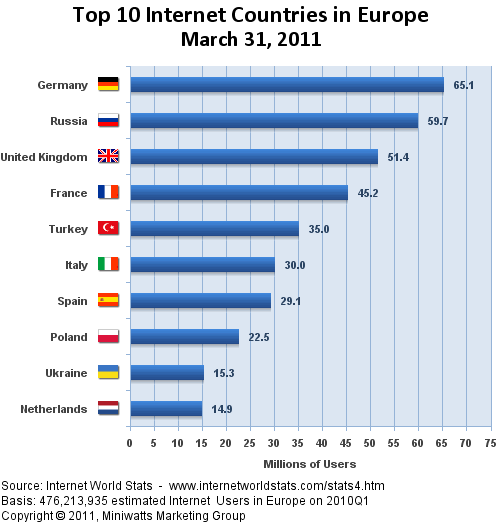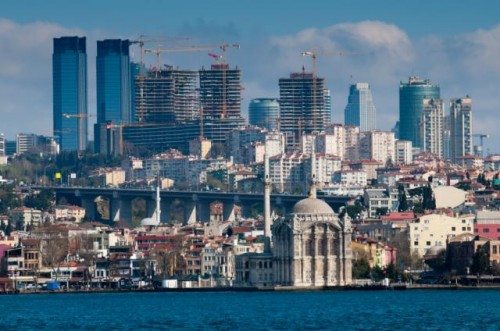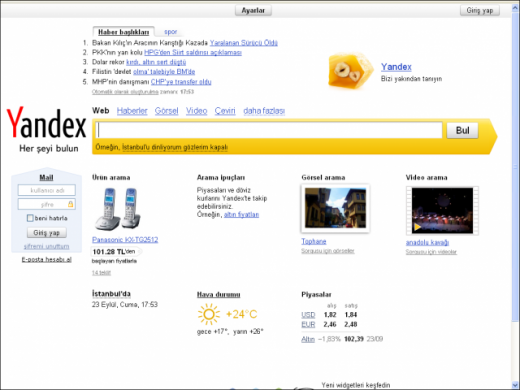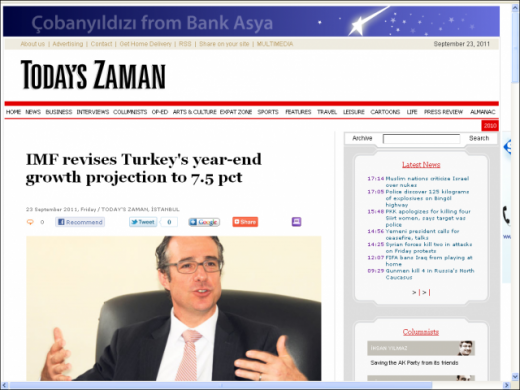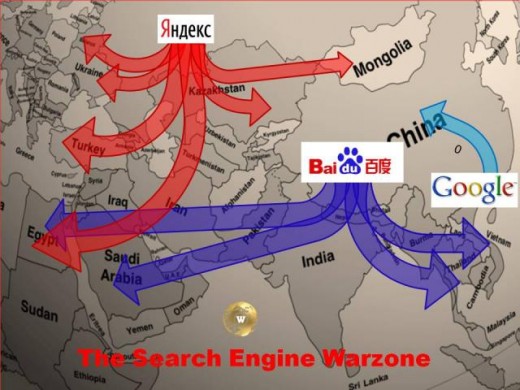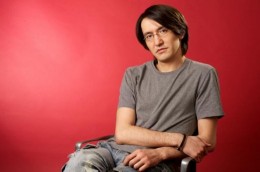Since their highly successful IPO in May this year when Yandex’s shares increased in value 55% on day one and raised $1.3 billion, the speculation (especially from me) has not been when the company would launch into new markets – but which and when. This week Yandex finally put us out of our misery by launching into Turkey.
Alexander Laryanovsky is the Head Of Regional Development at Yandex and he explained to Multilingual-Search.com the reasons why Yandex chose Turkey as its first non-slavic country market, “Turkey is one of the countries where virtually only one search system is present and web users have no alternatives.” Alexander is referring to Google which is the only search engine active there following the demise of other attempts in the early days of search engines.
Alexander Laryanovsky goes on to say that, “At the same time, the internet market is quite developed in this country. Turkey has the 13th largest internet audience in the world with 35 million of users (see the Internet World Stats chart above). There are also a lot of web sites and services in the Turkish segment of the internet. A developed web market is very important for a search system, because it indexes existing content.”
Alexander Laryanovsky is responsible for regional development at Yandex which includes its development in Russia’s regions and other countries as well as services for localization. Yandex is particularly proud of its local emphasis – especially in the Russian Federation where its results are highly localised and different for the vastly different regions of the world’s largest land mass country.
Alexander was also instrumental in launching Yandex in Kazakhstan and Belarus before the Turkish launch. He joined Yandex in 2008 and has been developing various Russian internet projects for over 15 years. He was born in 1971 in Chardzhou, Turkmenistan and graduated from Novosibirsk Institute of Arts with a degree in TV directing.
However, Yandex has always claimed that is success in Russia and survival of the Google onslaught has been due to its close local knowledge. It could be argued that the existing non-Russian countries are culturally close to Russia in that Belarus, Ukraine and Kazakhstan are all using the Cyrillic alphabet for their languages.
How does a Russian company deal with culture?
The challenge for Yandex is to prove that it is indeed capable of lauching into a non-slavic market and yet still succeeding. Alexander agrees that Turkey is culturally different. He says, “Yes, of course it is different, but we are coping with it.”
“Technology alone is not enough to make a good search engine, we also need an understanding of the local culture, language and users’ preferences. Our launch in Turkey would not have been possible without our Turkish team. Currently, there are a couple dozen people working in our Istanbul office, including analysts, managers and translators. The majority of our team in Turkey is directly involved in product development. Our local Turkish team defines our core direction in this country.”
Alexander is making a reference to the fact that Google does not have offices focusing on developing its presence in many markets and one of the reasons Russia was tough for Google was its reluctance to accommodate systems capable of handling the Russian language – and putting teams on the ground in the market. He is particularly keen to stress, “Almost everything we did for Turkey was developed specifically for this country.”
The great city of Istanbul is one part of the Turkey which technically lies inside Europe. The other site of the Bosphorus is actually classed as Asia. However, Turkey has been trying to gain membership of the European Union. It is also the country with the second most engaged internet population after the Dutch.
Economically, this eastern end of the Mediterranean has an economic growth rate others would die for (see below) – and its major economic issue is one of inflation. Bordering in the east with Georgia which in turn borders with the Russian Federation, Turkey is surprisingly close to Russia. It is due south from Moscow and a very popular destination for Russian holidaymakers.
One cloud on the horizon is the fact that both Yandex and Baidu are looking to expand internationally targeting high economic growth countries with an active web and internet population. They are also interested in markets which Google serves less well. Taken together, these characteristics limit the choices that both search engines have and it is highly likely that both will launch as competitors to Google in the same markets going forwards. Egypt, for instance, could well be candidate where the two emerging search engines may clash directly.
Alexander Laryanovsky says that the differences between Russians and Turks are surprisingly small though there are some important ones, “There are no principal differences, there are details; but, as is well-known, the devil is in details.”
He explains how details are not overlooked, “Our Turkish staff together with our analysts and marketing managers has been studying the preferences of Turkish web users to modify our products or even develop completely new products. For example, we noticed that Turkish users are very interested in news, so we added more details to our snippets for the most popular Turkish web sites. Another example is product search. We realized that it is a very important area and we quickly developed a new product specifically for the Turkish audience.”
The Turkish language is extremely complex for search engines
“We understand that this is just a beginning for us. You cannot get complete understanding of country and users from surveys. As soon as web users start using Yandex, we will discover more new details, than all the information we already know. It will allow us to deliver better results.”
The Russian language is complex but it turns out the Turkish language is frighteningly tough. Alexander again, “The difference between Russian and Turkish is indeed great. The Turkish language has a much more complicated morphology so, for example, while a Russian verb can have no more than 200 word-forms on average, a Turkish verb can have up to one hundred thousand forms. We naturally had to consider this complexity while developing our algorithms. This was a real challenge for our linguists and programmers.”
Google and Yandex have a different approach?
What does Alexander think of Google’s current performance in Turkey – presumably its not impressive enough otherwise Yandex would have chosen elsewhere? Alexander’s answer is surprisingly direct, “Google is performing in Turkey as in other countries. Google is a global company that makes products for the global market. Yandex has a different approach. We develop locally-specific search services in every country we are working.”
Yandex will be putting some limited promotion behind the launch no doubt, but actually the product is the most important marketing tool. Says Alexander, “We believe that the best promotion of services is the quality of these services. This is even more so with internet services where everything is accessible just in one click. That is why we will try to attract more traffic by concentrating our efforts on the quality of our services. Maybe we will make an advertising campaign sometime in the future, but first we want to know the reaction of Turkish web users to our product.
The new head of Turkey is Yandex’s Turkish Product Director is Alisher Hasanov who leads the Istanbul based team.
Intriguingly, Alexander revealed that Yandex began crawling Turkish sites already one year ago – so the preparation has been going on for some time. That also means that other planned countries must be being crawled right now.
Are there are results yet to speak of for Turkey? Alexander says, “It is early to make conclusions yet. But, as we see from blogs, people are really interested. They think some of our services are better than Google’s and they send us bug reports. Generally, they are glad that they have an alternative now.” Time will tell whether Google really needs to worry.

